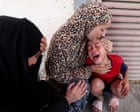
In recent days, global attention has been drawn to a series of distressing events unfolding in conflict zones and around legislative processes. These situations highlight the challenges faced by international communities, humanitarian workers, and legislative bodies amid ongoing crises and changes in governance. Despite the tensions, there are efforts underway to address these issues positively and constructively.
In Gaza, tragic incidents underscore the severe humanitarian challenges affecting the region. An Israeli strike in central Gaza tragically claimed the lives of at least 15 people, including 10 children, who were queuing for medical assistance. This incident is a part of a broader escalation in conflict, with ongoing hostilities resulting in significant casualties. While the environment remains tense, there is cautious optimism as negotiations for a ceasefire are making progress, raising hopes for a reduction in violence and a path towards peace.
Simultaneously, aid workers in Gaza are striving to manage the surge of casualties resulting from hostilities. Daily incidents, termed as “mass casualty events,” have overwhelmed medical facilities, with numerous individuals suffering injuries while attempting to access food and essential supplies. Despite the challenges, humanitarian organizations remain committed to their mission of providing aid and support to those in need, underscoring the resilience and dedication of workers on the ground.
In the Red Sea, a humanitarian rescue operation unfolded following an attack on the Greek cargo ship, Eternity C, by Houthi forces. This incident led to the sinking of the ship, and while seven crew members were thankfully rescued after a prolonged period in the water, efforts continue to locate the remaining crew, with some still missing and feared abducted. The rescue teams, comprising international security firms and local authorities, demonstrate the collaborative efforts in place to respond to crises, highlighting solidarity and cooperation in emergency situations.
Meanwhile, in the realm of governance, changes in legislative processes have been observed following the dissolution of legislative bodies. In France, the acceleration of procedures and legislative blockades have characterized the current parliamentary climate. Despite these challenges, an increased number of laws have been implemented compared to previous years, reflecting a proactive approach to governance amid political restructuring. These legislative dynamics illustrate the evolving nature of governance systems in response to both domestic and international pressures.
These recent events across different contexts emphasize the complexity of navigating crises and legislative challenges in varying environments. The resilience and commitment of those involved, whether on the humanitarian or legislative front, remain crucial as stakeholders continue to work towards resolution and positive outcomes. The focus remains on fostering peace, supporting affected populations, and ensuring that governance evolves to meet contemporary challenges effectively.
As developments continue to unfold, the international community watches with a hopeful yet cautious eye, seeking pathways that prioritize safety, stability, and cooperation across borders and disciplines. These stories of effort and perseverance serve as a reminder of the power of collaboration and the shared human spirit seeking solutions in the face of adversity.
Source: {link}
